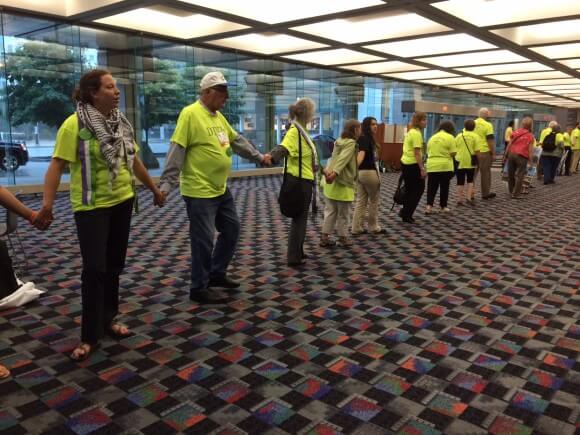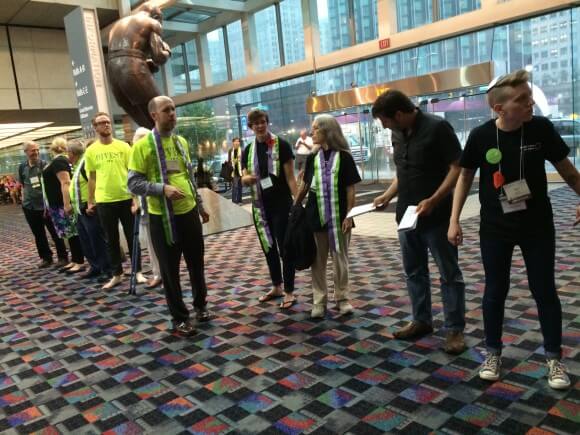


In the U.S. movement for justice in Palestine, the Presbyterian General Assembly vote Friday to divest is a major turning point. It represents the first time that a large mainstream U.S. church took a formal step to do what it’s able to do to end the Israeli Occupation. Perhaps even more important in assessing the impact of this event for the U.S. public, it reflects recognition by the rank-and-file church representatives — its General Assembly, comprised mostly of rank-and-file church members — that the conservative and militant Zionist U.S. opposition to the BDS movement relies only on name-calling and guilt-tripping, rather than fair and reasoned argument on the merits of their position.
Opponents of the divestment proposal wore t-shirts bearing the slogan: “Love us, don’t leave us!” The opposition arguments heard again and again at the plenary were threats that the adoption of the allegedly “anti-Semitic” proposal would anger and alienate the U.S. Jewish community from the Church. Not one argument was heard in defense of the merits of their position. Proponents of the proposal, in response, appealed to the Assembly to do justice, to have the courage to place their values above their fears of being accused of anti-Semitism. These appeals by proponents to the conscience of the voting rank-and-file Church membership were what carried the day.
The victory was for this reason far more significant than it appeared to be, as reported in mainstream media. It showed not only that rank-and-file Church members recognized the bankruptcy of the opposition, but that they also understood the facts on the ground and knew that these facts compelled Church divestment from the Occupation.


Thanks for a great article – this sentence of yours is a magnificent summary “the conservative and militant Zionist U.S. opposition to the BDS movement relies only on name-calling and guilt-tripping, rather than fair and reasoned argument on the merits of their position.”
Bravo! Thank you for your coverage of this, and your activism for justice.
I sincerely hope that others will join you, including the US government. The threats were ineffective, thank goodness. That one group of people tried to intimidate and actually threaten peacemakers is so revealing of their fear and hubris that combined, are not invincible (as PCUSA has proven), but are dangerous in any form when allowed to prevail.
You are kidding yourself if you feel that this weak move will influence any sort of policy or start a trend. It was a last gasp. And no, it was not anti-Semitic but it made anti-Semites very happy with themselves.
Amen.
I think the days of using the anti Semitism slur to defend systematic evil in the territories are coming to an end.
We have to stand with decent Jews/of conscience and show them that it is in everyone’s interest to end the occupation and free Judaism from YESHA.